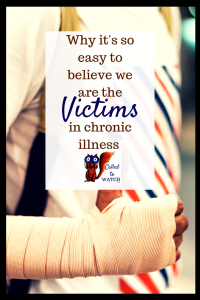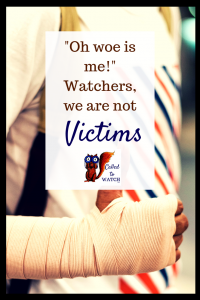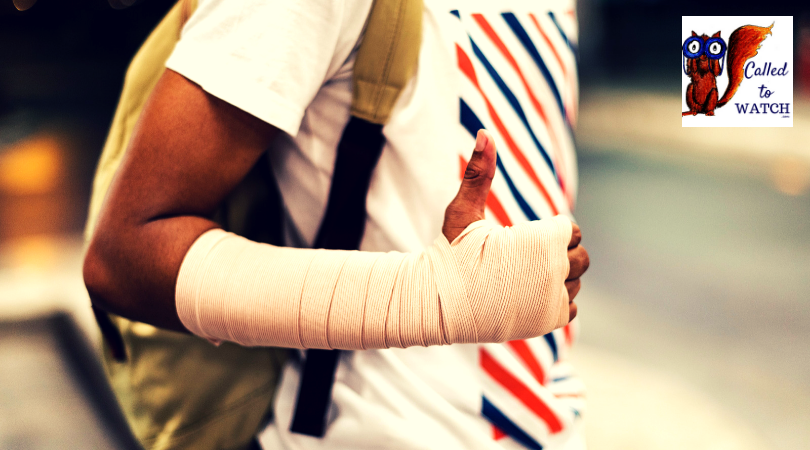Which character would you be in a novel?
The hero?
The villain?
The love interest?
Some days it’s easy to feel like the victim. The character that gets smacked over the head with a tonne of Tragedy just so the hero can realise that yes, the world does need saving. I’d better find my cape…
You might not struggle with your health on the same level as your friend or family member with a chronic illness, but it can still feel like you’ve got the raw end of the deal.
After all, your life has been disrupted too! You have added responsibility, added financial strain, added demands on your time and energy. On top of all that you spend a lot of time in close quarters with someone who is unwell (and the truth is, unwell people aren’t always as much fun as ‘well’ ones – I personally turn into a monster when I have the flu).
When you feel overlooked and depleted it’s easy to imagine that your identity is not in being a Watcher, but rather a Victim (yes, with a capital V).
What does it look like when we become the victim?
- Every circumstance feels designed to put you at a disadvantage. The rain, the queue at the shops, your loved one’s newest diagnosis
- You sigh a lot – either internally or physically. Another tragedy? Oh well, figures. The world is out to get me and I’m so tired of it.
- It becomes increasingly easy to see things from a negative point of view. And not just negative in general, but negatively impacting you. In fact, when you encounter a new piece of information or snippet of news, the first thing you think of is: how is this going to crush me further?
- It becomes hard to sympathise with anyone else. The idea of wiggling into someone else’s shoes, particularly if they’ve added to your burden in any way, seems incomprehensible.
- Your loved one’s illness is a personal affront to you. How dare it make your life worse?

Why is it wrong to believe yourself to be the victim?
Being a victim means:
- It is easier to overlook others’ sufferings because we are thinking of our own
- We are less likely to give, serve or expend energy for someone else, because our own plate feels full enough
- We can become mistrustful, not only of circumstances, but also the motives of friends and family, assuming they don’t have our best interests at heart
- We forget that God loves us and is working the best for us in every situation
- We seize every opportunity for control because we feel vulnerable and helpless
- Our enjoyment of leisure activities and ‘small pleasures’ is reduced because we are certain they will not last, or make us happy, and we are too busy looking into ourselves to look at the One who will.
How does it happen?
- We give into our natural desires to put ourselves first in every situation
- We fall into fear, and do not trust God with our present or our future
- We begin to catalogue the ‘bad things’ that have happened in an effort to stay in control – and eventually this becomes second nature
- We become so afraid of being disappointed that we refuse to hope
- We embrace tragedy as part of ‘who we are’ because it’s easier than weeping and grappling with it
Some truths about making yourself the victim:
- Seeing ourselves as a Victim is a very natural desire. It’s a desire to shift the blame or the pain away from ourselves. In Genesis, Adam said (in effect), “it was not me! I’ve been victimised by the woman you created for me!”
- Victimising is a fatalistic response to tragedy. It’s one that seeks to minimise personal suffering, “what will be, will be.”
- When we see ourselves as a Victim, we see ourselves as innocent. A Victim is undeserving of their situation. In any specific circumstance this may very well be true – but it does not make you a saint. We are ‘true victims’ a lot less often than we suppose.
- Victimising removes choice. “I can’t help it, I’m the Victim.” Yet we always have a choice. In the our most helpless situation, we have a choice what thoughts will go through our minds and how we will respond.

What can we do to stop seeing ourselves as the victim?
- We can look deep into ourselves. Few of us will nod our heads at every dot point in these lists – but for most of us, I suspect some will be familiar
- Remember that often we slip in and out of seeing ourselves as a victim. What sort of situations makes you disgruntled and begin your ‘woe is me!’ sighs? Once you know them, you know when to start praying!
- If we commit to really listening to others and do not blinker ourselves to the suffering in the world, it’s very difficult to slip into the self-centredness required for victimisation
- Practice thankfulness
- Most of all turn to Jesus. If we remind ourselves constantly of the hope we have in Him, it’s much harder to fall into disappointment. When we know His power is working for us, we are less likely to feel helpless and vulnerable.
Conclusion
Often seeing ourselves as a Victim is a way of making sense of tragedy and regaining a sense of control. Perhaps the easiest way to avoid this is to realise that while we may not be able to coordinate our circumstances, God can.
It is only when we trust in Jesus that we are really in control, because it is only with His help that we are truly able to choose not to be a Victim.
Don’t want to be a victim?
ONE: Recognise the sufferings of others as well as your own
TWO: Realise that you are never completely helpless, you can always choose your response to circumstance
And so next time you feel tempted to sigh heavily and catalogue a list of your current woes, remember my friends – we are Watchers, not Victims!
// Do you find it easy to slip into believing you are the Victim? How does this affect your relationships?
Read the rest of the series! Watchers we are not… delegates, impartial observers, saints, biographers or doctors.
PS: Enjoyed the post above? Get the next one delivered straight to you! Sign up for email notifications
I’m also on Facebook, Pinterest & Twitter! Meet me there for more interesting reads, resources and community.

